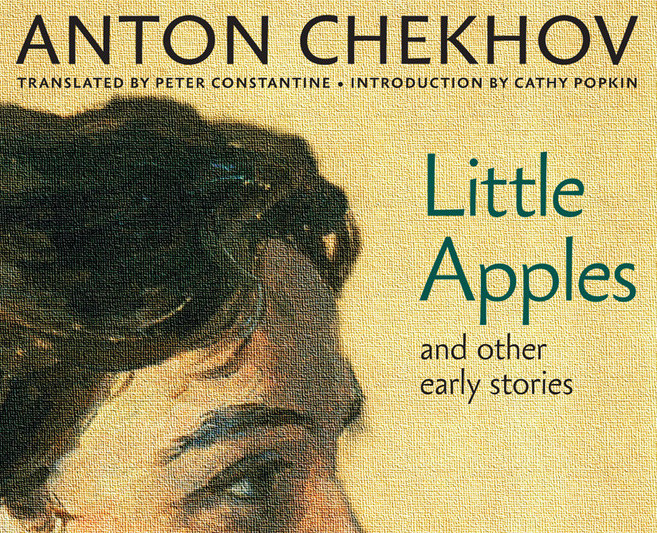Peter Constantine not only speaks German, Russian, French, Modern Greek, Ancient Greek, Italian, Albanian, Dutch, and Slovene, but he translates them as well. He has translated Machiavelli, Sophocles, Mann, Rousseau, and a host of others. As a translator from Russian, he has an interest in translating the lesser known, early works of Anton Chekhov.
In the West, Chekhov is known primarily as a playwright, but he was equally accomplished short story author. Peter Constantine’s most recent translation, Little Apples and Other Early Stories, out now from Seven Stories Press, is a collection of Chekhov’s early works, when he wrote under a pen name to support his family and put himself through medical school. These stories are tragic and comic; gut-wrenching and laugh-out-loud funny. Constantine’s translation captures the wit and skill that would make Chekhov known as one of the greatest writers of all time. I discussed Little Apples with him through email.
***
Daniel Goulden: What drew you to translating Chekhov, particularly his early stories?
Peter Constantine: Chekhov is one of the great stylists of Russian literature. His range and creativity present an interesting challenge for a translator; particularly his early stories of the 1880s, where every week he would publish several pieces in a number of literary magazines, sometimes two or three pieces per magazine, writing under different pseudonyms: Mr. Champagnsky, Man Without a Spleen, My Brother’s Brother. He had a great facility for writing fast and well and with spectacular energy and creativity. In the early years he wrote stories in many forms: high-school test questions, scientific conference proceedings, random diary entries, stories in the form of legal contracts where the layout of the story would also mimic the look of an official document, with a space for an official stamp in the corner. It is Chekhov’s creativity and constant experimentation that drew me to his early work. What also attracted me is that many of these stories have been neglected and are not available in English. With my first book, The Undiscovered Chekhov: Thirty-eight New Stories and my new collection that has just been published by Seven Stories Press, Little Apples and Other Early Stories, my aim has been to bring unknown stories to the attention of readers.
DG: Do you find that with translating one of the great Russian authors there is a lot of pressure to “get it right”? Is there room for experimentation?
PC: When you start out on a translation I think it is important to immerse yourself in the work, to engage with the text, and to avoid as much as possible the influence of outside factors, such as the status of the author in the literary canon. It you are worried by your author’s stature while you work, your translation will inevitably be stilted and wooden.
DG: Chekhov’s short stories are quite short, some are as short as a page, yet in that brief space he is able to elicit powerful emotions in his readers. What was it like to translate such short stories? How does it compare to translating longer works?
PC: Chekhov wrote many of the stories in Little Apples and other Early Stories for the magazine Oskolki (Fragments), which had a strict 100-line limit: Chekhov had to choose every word with extreme care, a quality we find in all his works, even in his later stories and plays where word counts were not an issue. In early stories like “The Philadelphia Conference of Natural Scientists” or “A Brief Anatomy of Man,” the particular challenge is to capture the Russian puns and wordplay in English. One has to try to make the lines as exciting and funny in English as it is in Russian.
DG: You’ve written a number of books on the use of slang in different languages. What slang did you encounter while translating the short stories and how did you render it into English?
PC: The books on Japanese slang that I wrote in the late 1980s and early 90s were focusing on the language of the Japanese streets, the rough, wild, and even the forbidden language of the sex trade and drug trafficking. Those books were meant as an antidote to the very formal Japanese grammars that existed at the time. Japan had suddenly become a powerful world economy, and it was the first time that many english-speaking people with different interests in Japan were trying to learn the language and understand the culture. Anton Chekhov was also interested in language, especially in creating characters through dialogue or speech. What is said and how it is said reveals much about a speaker. In the short story “A Doctor’s Romance,” for instance, the doctor describes his wife as: “Height: average. Skin and mucus membranes: normal. Subcutaneous layer of fat: adequate. Chest: satisfactory.”
DG: A huge part of translation is the creative aspect of rewriting someone’s work into a new language, but a translator can also be an academic and biographer. How did you fill these three roles as you translated Chekhov’s earlier and lesser-known works?
PC: The only role I filled in my Chekhov translations was that of the translator.
DG: In the translator’s note you mention the lasting image of Chekhov as “frail, wizened, and with a walking stick, an elder of Russian literature.” Is this image necessarily the most accurate one of Chekhov and to what extent do these earlier works complicate that image?
PC: In my preface to Little Apples and other Early Stories I mentioned that Chekhov was displeased with that last portrait of him that showed him as frail and elderly. He was 44 years old when he died of tuberculosis. He was a handsome young man about town, but Russia and the world preferred his portrait to hang next to that of Tolstoy and Dostoevsky as an elder of Russian literature.
*****
Read more Interviews:

